-
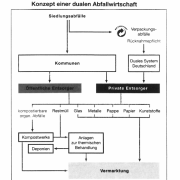 Elemente der Naturwissenschaft2002,2002Die Abfallentsorgung im 20. Jahrhundert Ein Spiegel unseres Umweltbewusstseins Jörn Heinlein Summary This contribution describes how people related to the waste they produce throughout the ages until the present. Undoubtedly the amount of waste that we discard nowadays is unsustainable. This is also due to its chemical properties.... read more
Elemente der Naturwissenschaft2002,2002Die Abfallentsorgung im 20. Jahrhundert Ein Spiegel unseres Umweltbewusstseins Jörn Heinlein Summary This contribution describes how people related to the waste they produce throughout the ages until the present. Undoubtedly the amount of waste that we discard nowadays is unsustainable. This is also due to its chemical properties.... read more -
 Elemente der Naturwissenschaft76,2002ELEMENTE DER NATURWISSENSCHAFT 76 1/2002 Die Grundversuchsanordnungen für die Lichtbeugung an Kanten Hanspeter Seipp Summary The simplest arrangements of edges that give rise to the phenomenon of light diffraction are presented. Especially two of them are of particular importance. They imply two different types of optical imaging and... read more
Elemente der Naturwissenschaft76,2002ELEMENTE DER NATURWISSENSCHAFT 76 1/2002 Die Grundversuchsanordnungen für die Lichtbeugung an Kanten Hanspeter Seipp Summary The simplest arrangements of edges that give rise to the phenomenon of light diffraction are presented. Especially two of them are of particular importance. They imply two different types of optical imaging and... read more -
 Elemente der Naturwissenschaft2002,2002Biogeochemische Stoffkreisläufe des Erdorganismus: Aspekte zur unterschiedlichen Bedeutung der Ozeane und Kontinente Meinhard Simon Summary Intensified research on global biogeochemical cycles in recent decades has led to a holistic concept of the earth, i.e. that it is considered as a self-regulating system, a whole, the biosphere and... read more
Elemente der Naturwissenschaft2002,2002Biogeochemische Stoffkreisläufe des Erdorganismus: Aspekte zur unterschiedlichen Bedeutung der Ozeane und Kontinente Meinhard Simon Summary Intensified research on global biogeochemical cycles in recent decades has led to a holistic concept of the earth, i.e. that it is considered as a self-regulating system, a whole, the biosphere and... read more -
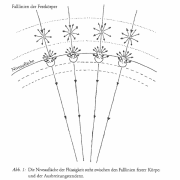 Elemente der Naturwissenschaft76,2002ELEMENTE DER NATURWISSENSCHAFT 76 1/2002 Bewegung in ihrem Bezug zu den Elementen Anregungen aus dem Zweiten Naturwissenschaftlichen Kurs zur Mechanik Wilfried Sommer Summary Starting from Steiner’s ideas about the elements as developed in his Heat Course, we examine free fall as well as the relation between dynamics and kinematics... read more
Elemente der Naturwissenschaft76,2002ELEMENTE DER NATURWISSENSCHAFT 76 1/2002 Bewegung in ihrem Bezug zu den Elementen Anregungen aus dem Zweiten Naturwissenschaftlichen Kurs zur Mechanik Wilfried Sommer Summary Starting from Steiner’s ideas about the elements as developed in his Heat Course, we examine free fall as well as the relation between dynamics and kinematics... read more -
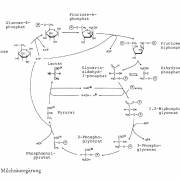 Elemente der Naturwissenschaft2002,2002Abbau und Umwandlung bei biochemischen Prozessen am Beispiel der Gärungen Hans-Joachim Strüh und Birgit Jäckel Summary We know from the history of arts and crafts that early experience of ‘practical chemistry’ dates back to very early times. Apart from the production of materials such as metal, glass and clay as well as tanning and dyeing... read more
Elemente der Naturwissenschaft2002,2002Abbau und Umwandlung bei biochemischen Prozessen am Beispiel der Gärungen Hans-Joachim Strüh und Birgit Jäckel Summary We know from the history of arts and crafts that early experience of ‘practical chemistry’ dates back to very early times. Apart from the production of materials such as metal, glass and clay as well as tanning and dyeing... read more -
 Elemente der Naturwissenschaft2002,2002Abbau der primären Silikate, Freisetzung der Nährstoffe und Tonmineralbildung Ihre Bedeutung für die Pflanzenernährung und eine nachhaltige Landwirtschaft Edwin Scheller Summary During normal soil development, nutrient-rich primary silicates and other minerals are broken down and the plant nutrients in them are released into the soil... read more
Elemente der Naturwissenschaft2002,2002Abbau der primären Silikate, Freisetzung der Nährstoffe und Tonmineralbildung Ihre Bedeutung für die Pflanzenernährung und eine nachhaltige Landwirtschaft Edwin Scheller Summary During normal soil development, nutrient-rich primary silicates and other minerals are broken down and the plant nutrients in them are released into the soil... read more -
Elemente der Naturwissenschaft2002,2002Metallprozesse Ein Thema der Lehrplanangaben Rudolf Steiners für den Chemieunterricht der 12. Klasse der Waldorfschule Günther Heuschkel Summary Rudolf Steiner proposed that in the twelfth school year at the Waldorf School chemistry should be taught in its most intimate connection with man. ‘It would be desirable to have an inorganic, an... read more
-
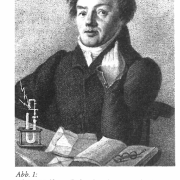 Elemente der Naturwissenschaft2002,2002Erfahrungen und Vorschläge zum Chemieunterricht in der Waldorfschule Wolfgang Schad Summary How has education in chemistry developed during the 80 years of the Waldorf-School movement? The main points up to the present day are characterized, beginning with the approach of Eugen Kolisko. The obvious shortcoming is a special problem of... read more
Elemente der Naturwissenschaft2002,2002Erfahrungen und Vorschläge zum Chemieunterricht in der Waldorfschule Wolfgang Schad Summary How has education in chemistry developed during the 80 years of the Waldorf-School movement? The main points up to the present day are characterized, beginning with the approach of Eugen Kolisko. The obvious shortcoming is a special problem of... read more -
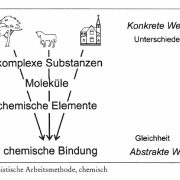 Elemente der Naturwissenschaft2002,2002Zu Reduktionismus und Phänomenologie im Unterricht Peter van den Breemer Summary This contribution deals with the connections to be found between reductionist and phenomenological chemistry. How can molecular thinking be linked with the manifest properties of substances and above all with the world of human perception? A ‘multi-level... read more
Elemente der Naturwissenschaft2002,2002Zu Reduktionismus und Phänomenologie im Unterricht Peter van den Breemer Summary This contribution deals with the connections to be found between reductionist and phenomenological chemistry. How can molecular thinking be linked with the manifest properties of substances and above all with the world of human perception? A ‘multi-level... read more -
Elemente der Naturwissenschaft2002,2002Die Bedeutung der Chemie für die Pädagogik und ihr sozialer Aspekt Ulrich Wunderlin Summary The significance of chemistry as a school subject with a structure for general education Will be outlined. In addition, the necessity of such an education will be explained. In accordance with the guidelines for education in Waldorf or Rudolf... read more